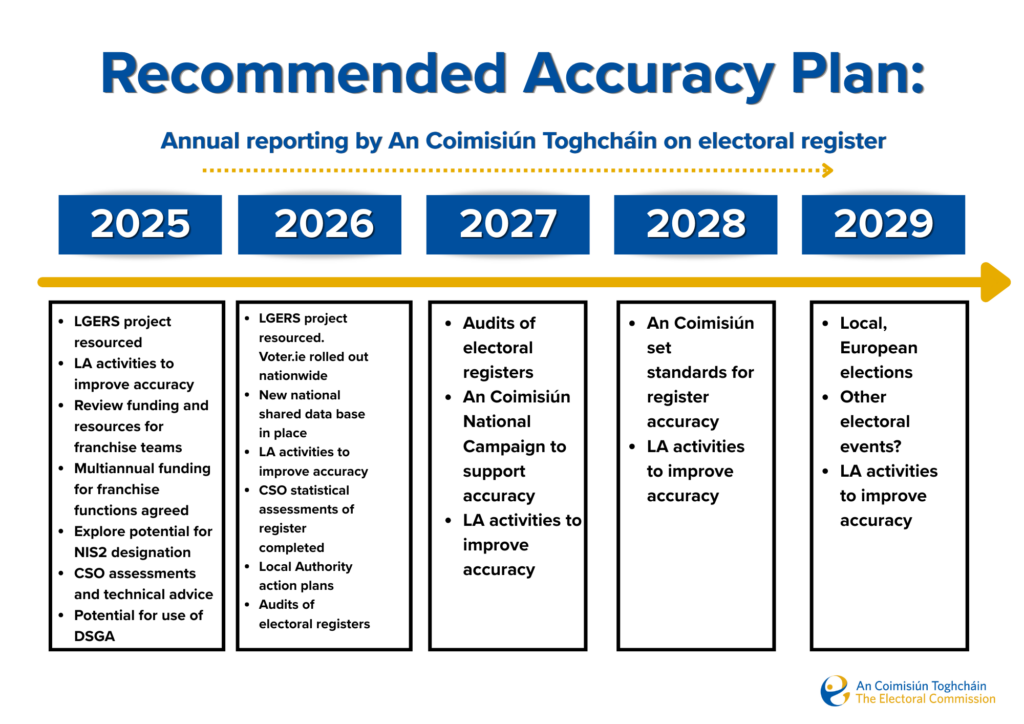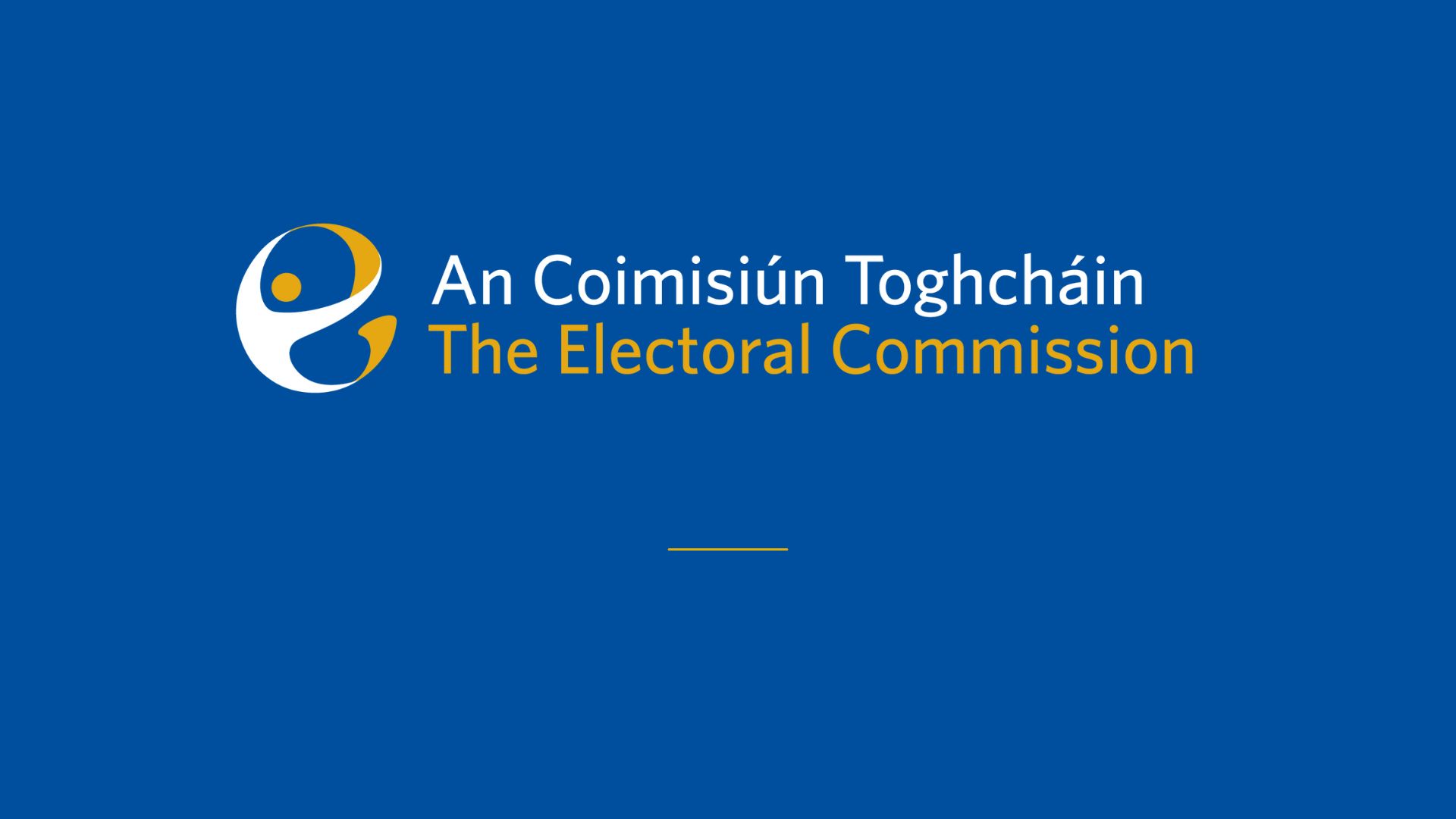An Coimisiún Toghcháin Recommends Comprehensive Plan to Finally Address Electoral Registers Accuracy
First Report on Ireland’s Electoral Registers Calls for Accuracy Audits, Greater Priority and Resources for this Fundamental Part of Our Democratic System.
1 May 2025 – An Coimisiún Toghcháin’s first Oversight Report on Ireland’s Electoral Registers says that it is ‘deeply concerned’ at the legacy accuracy issues on the electoral registers. The report recommends a plan for the Department of Housing, Local Government and Heritage and the 31 local authorities to finally address this issue before the next round of electoral events in 2029. This should begin with audits of every electoral register in the country.
There are an undefined, but potentially significant, number of duplicate or redundant entries on the 31 electoral registers that are managed and maintained by the local authorities. This issue goes back decades with people registered more than once in one or more local authority areas, people who have emigrated and people who have passed away remaining on the registers.
Accurate registers make it possible to more definitively assess voter turnout and to understand the scale of non-registration.
The Report’s key recommendations set out the need for:
- accuracy audits of each register,
- a national awareness campaign focused on accurate voter registration,
- the setting of standards for accuracy,
- the increase of resources for local authority electoral register functions and;
- increased prioritisation of the registers and multi-annual plans in local authorities.
This first Oversight Report on the Electoral Registers is An Coimisiún Toghcháin’s assessment of the current status of the accuracy and completeness of the electoral registers, and of how they are managed and maintained by Ireland’s 31 local authorities. The overview is informed by data provided by the local authorities and shows significant disparities between them. It sets out the position at a national level and includes key data for each electoral register, assessing each local authority in terms of accuracy, completeness, resourcing and activities carried out to improve the register. The Report makes recommendations for each local authority.
An Coimisiún recognises the enormous amount of work carried out by local authority franchise staff in implementing the provisions of the Electoral Reform Act 2022. This provided for online registration across the country; a rolling register; and a new national Local Government Electoral Register System. (“LGERS” – to come into effect in 2026). Allied to this, franchise staff were managing applications during an exceptional year for electoral events. An Coimisiún’s view, as set out in the report is that the level of resources is “far from sufficient to deal with the tasks required”.
Accuracy – an accurate electoral register is one in which there are no false, duplicate or incorrect entries, where all data held for an entry are correct and where each person is registered only once
The report individually assesses each of the 31 electoral registers based on the resources dedicated to the franchise function, the activities undertaken to improve the registers and by using ‘accuracy indicators’ – PPSNs, dates of birth and Eircodes. There are widespread disparities between local authorities.
The accuracy indicators identified by An Coimisiún are used by local authorities to verify a person’s identity and to identify duplicate and redundant entries, the removal of which improves the accuracy of registers. There is a clear correlation between low levels of accuracy indicators and apparently high registration rates, which are determined by looking at numbers of those eligible to vote in local elections (which has the widest eligibility) in comparison with the population aged 18 years and over (based on CSO estimates).
- Based on the reported data, 11 local authorities have more people on their local election register than the entire population of those areas eligible to be on the register.
- All of these 11 local authorities have below average accuracy indicators. 8 have the lowest in the country. These are Sligo, Donegal, Galway County, Cork County, Carlow, Cavan and Mayo.
Management of the Electoral Registers
- From information provided by the local authorities there are widely varying levels of priority and resources given to the electoral registers across the 31 local authorities, and even between local authorities of similar sizes. Some local authorities have made significant efforts to improve their electoral registers. But this is not the case for the majority.
- Significant modernisation of the electoral registration system and processes was introduced under the Electoral Reform Act, 2022, changing how and when people can register, and changing the nature of the work of local authority franchise staff. However, there does not appear to have been any review undertaken of the resourcing needed to properly meet these changing requirements.
Completeness – A complete register is one on which those who are eligible electors are registered on each of the electoral registers.
- It will not be possible to estimate completeness until the issue of accuracy is addressed.
Speaking on the publication, Art O’Leary Chief Executive of An Coimisiún Toghcháin stated:
“The accuracy and completeness of the electoral registers, as well as how they are managed and maintained, are fundamental to Ireland’s democratic process.
“The issue of accuracy needs resources and increased prioritisation by local authorities in the long term to ensure that the management of our electoral registers is improved.
“Ireland’s voters deserve the strongest and most accurate electoral registers they can have.”
– ENDS-
For further information, please contact:
Brian Dawson, Communications and Public Affairs Manager,
An Coimisiún Toghcháin, The Electoral Commission,
Brian.dawson@electoralcommission.ie / 086 0749344
Editor’s Note:
Oversight of the Electoral Register
An Coimisiún Toghcháin has a statutory oversight role on the status, functioning, completeness and accuracy of the registers. It may also carry out research, make recommendations and set standards.
An Coimisiún Toghcháin presents this report in the exercise of its statutory powers under section 64 and section 69 of the Electoral Reform Act 2022 to support and make recommendations for improving the completeness, accuracy and maintenance of the electoral registers.

An Coimisiún Toghcháin, The Electoral Commission
An Coimisiún Toghcháin is a statutory, independent body, established on 9 February 2023 with responsibility for a broad range of electoral functions set out in the Electoral Reform Act 2022. An Coimisiún is central to Ireland’s electoral system, carrying out a range of existing electoral functions, including:
- overseeing the modernised Electoral Register, making recommendations and setting standards in relation to its maintenance and updating;
- promoting public awareness of, and working to increase public participation in the State’s electoral and democratic processes through education and information programmes;
- responsibility for the registration of political parties;
- the regulation of online paid-for political advertising, ensuring transparency in respect of online political advertisements during the period of an election or referendum campaign; (Legislation not yet commenced); and
- responsibility for the investigation and monitoring of online disinformation, online misinformation and manipulative or inauthentic behaviour online during election campaign periods, as well as functions to prevent manipulative or inauthentic behaviours online. (Legislation not yet commenced).
An Coimisiún is also tasked with several new electoral roles, including:
- making reports for the Minister in relation to local electoral boundaries;
- preparing research programmes and conducting research on electoral policy and procedure, and providing advice, as required, to the Minister and Government;
- the preparation of ex-post reports on the administration of electoral events;
- the decision-making, oversight, secretariat and supporting services associated with explaining the subject matter of referendum proposals, the promotion of public awareness of referendums and encouragement of the electorate to vote at referendum polls; and
- the conducting of reviews and making reports in relation to the constituencies for the election of members to the Dáil and the election of members to the European Parliament.
It is anticipated that the initial set of functions assigned to An Coimisiún will be expanded upon as it builds capacity and expertise.
